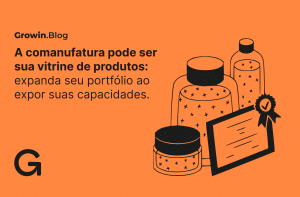Did you know that while many co-manufacturers struggle to fill their production lines, others are seizing profitable opportunities simply because they know how to identify the right niches?
In the CPG (consumer packaged goods) market, the key to scaling efficiently is not just production capacity, but knowing where and how to invest that capacity.
Identifying profitable market niches relies on a process grounded in solid data and clear market trends.
Let’s explore how you can strategically position yourself to seize the opportunities in front of you — turning your production capacity into profit.
Profitable market niches: more than fads, they are consolidated trends
According to McKinsey, 65% of companies in the CPG sector recognize outsourcing — especially co-manufacturing — as a decisive factor to accelerate new product launches and reduce fixed costs.
But success depends on focusing on segments with real growth and profitability potential. Data from Statista shows categories like:
- Plant-based foods: global growth of 12.3% annually, with a market estimated at US$27.9 billion in 2024.
- Healthy and functional snacks: average annual growth of 10% in Brazil, driven by consumers seeking convenience and health.
- Sustainable and organic products: 15% yearly increase in demand, with consumers willing to pay up to 20% more for environmental certifications.
- These numbers go beyond trends: they are clear indicators of where you can direct your production capacity to reap faster rewards.
How to position yourself for these emerging niches?
Now that you know these niches are in the spotlight, the challenge is how to capitalize on these opportunities — and co-manufacturing is the key to taking that next step.
Take Nestlé as an example, which used co-manufacturing to quickly launch its plant-based product line. The brand leveraged outsourced production to validate new recipes rapidly, reducing development time and testing formulas without overloading its infrastructure.
This model enabled Nestlé to expand its vegan product line across multiple markets, including Europe and Asia, with speed and flexibility.
Another interesting case is Heineken, which turned to co-manufacturing to launch its non-alcoholic beer line.
The brand not only ramped up production to meet rising demand for low-alcohol beverages but also flexibly customized packaging to quickly adapt to local tastes.
Heineken has leveraged this strategy to validate regional markets and understand consumer behavior, all without heavy investments in new factories.
Production flexibility: what the market demands (and pays for)
Capacity alone is not enough if you can’t adapt quickly.
These profitable, growing niches rely on smaller batches, varied formulations, and customized packaging.
If your plant supports rapid variations, digital label printing, and modular lines, you have a huge strategic advantage. Investing in certifications like FSSC, organic, kosher, or even regional certifications opens doors to more demanding, lucrative niches.
For example, Nestlé, with its vegan chocolate line, needed co-manufacturing partners specialized in alternative ingredients and dairy-free formulas. Thanks to outsourced production flexibility, Nestlé met growing demand without drastically adjusting its factories, optimizing launch time and customization.
Explore sustainability as a differentiator for rising niches
Today, sustainability is a concrete competitive advantage, especially in niches like food and beverages, cosmetics, and supplements.
Practically, co-manufacturers that implement sustainable processes and environmental certifications win premium contracts, increase market value, and differentiate themselves — all at once.
A NielsenIQ study reveals that 66% of consumers are willing to pay more for brands adopting sustainable practices. This is a clear trigger: co-manufacturers investing in sustainable practices — from production to packaging — not only connect with conscious consumers but also attract high-value, stable contracts.
For example, Unilever used co-manufacturing to launch lines with recyclable packaging and concentrated products, reducing development time by 35% and lowering emissions.
Sourcing is your greatest ally in exploring profitable market niches
Using platforms like GrowinCo. to accelerate niche identification and partnerships is the missing investment your company needs to access new profits.
Co-manufacturing is not just about production. It’s about aligning with growing niches, having the flexibility to meet new demands, and basing decisions on concrete data for quick and assertive moves.
More than that, it’s about building a strategic partnership with brands ready to innovate and grow — knowing that agility and adaptability to new markets are key.
If your plant is flexible, sustainable, and aligned with market trends, you’re already on the path to becoming an indispensable partner for these clients.
We can help your company accelerate this journey with data, market intelligence, and the supplier and co-manufacturer network you need to grow fast.
GrowinCo. connects co-manufacturers to structured data, market intelligence, and real demands from large and mid-sized CPG brands, facilitating:
- Mapping emerging niches and analyzing manufacturing capacity.
- Visibility into real projects with specific production needs.
- Qualified partnerships with brands seeking agility, innovation, and cost reduction.
- The platform helps turn data into concrete contracts, monetizing your capacity intelligently.
Want to get ahead and explore the niches that will dominate the CPG sector in the coming years? Talk to the GrowinCo. team and discover how to turn intelligence into opportunity.




